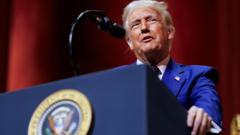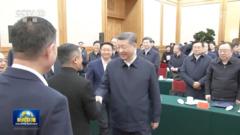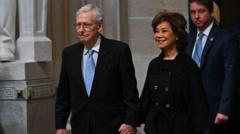The White House has announced that President Trump will enforce tariffs of 25% on Mexico and Canada and 10% on China beginning February 1. These measures, justified by combatting drug distribution and managing immigration, may lead to reciprocal actions from affected nations. Both Canada and Mexico have signaled readiness to retaliate, alerting to possible economic ramifications within the US.
White House Announces New Tariffs on Canada, Mexico, and China Amid Rising Trade Tensions

White House Announces New Tariffs on Canada, Mexico, and China Amid Rising Trade Tensions
As the US prepares to implement tariffs on neighboring countries and China, concerns over trade relations and economic repercussions intensify.
The White House is set to impose tariffs starting this Saturday, with President Donald Trump announcing a 25% levy on imports from Canada and Mexico and a 10% tax on goods from China. This decision has prompted concerns of a potential trade war, given that these three nations accounted for a significant 40% of US goods imports in the past year.
White House press secretary Karoline Leavitt stated that the tariffs are a response to the distribution of illegal fentanyl across US borders, attributing over ten million American deaths to such incidents. The decision has broader implications, however, as it also relates to the president's commitment to manage immigration levels and address significant trade deficits with Mexico and Canada.
Recently, Trump suggested customers would face increased prices as a consequence of the tariffs, acknowledging that import taxes could impact average consumers. Nevertheless, he maintains that these measures align with his promises made during the election campaign to protect American interests.
On Friday, Trump indicated future tariffs may also target the European Union, citing grievances about the bloc's treatment of the US. Although he has previously hinted at tariffs exceeding 60% on Chinese goods, immediate action has been delayed as his administration conducts a thorough analysis of this issue.
International reactions have begun to surface, with Canadian Prime Minister Justin Trudeau asserting that if the US moves forward with tariffs, Canada will take countermeasures. Additionally, both countries have sought ways to prove compliance with US concerns over border controls.
China's response to these developments includes calls for cooperation and "win-win" solutions to trade disputes, as expressed by Vice Premier Ding Xuexiang during the World Economic Forum. Observers note that with the potential for retaliatory tariffs, the economic repercussions could escalate, impacting a range of industries and pushing prices for essential goods such as oil and groceries higher.
Overall, as the new tariffs loom, the economic impact on both the US and its trading partners continues to draw scrutiny, with concerns that escalating trade tensions could significantly disrupt global markets.



















